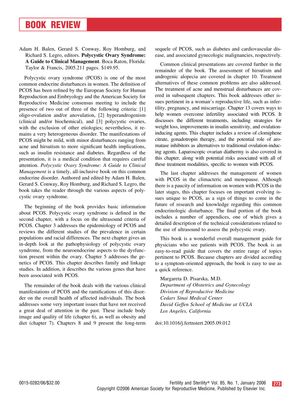Book Review
January 2006
in “
Fertility and Sterility
”

TLDR The book provides a detailed guide on managing Polycystic Ovary Syndrome and is useful for physicians.
The document is a book review of "Polycystic Ovary Syndrome: A Guide to Clinical Management," which provides a comprehensive overview of Polycystic Ovary Syndrome (PCOS), a common endocrine disorder in women. The book, edited by Adam H. Balen, Gerard S. Conway, Roy Homburg, and Richard S. Legro, covers the definition, epidemiology, pathophysiology, genetics, and various clinical manifestations of PCOS. It also addresses issues such as body image, quality of life, obesity, diet, long-term sequelae like diabetes and cardiovascular disease, and associated gynecologic malignancies. Clinical presentations such as hirsutism, androgenic alopecia, acne, menstrual disturbances, infertility, pregnancy, miscarriage, and management during climacteric and menopause are discussed. The book is praised for being an easy-to-read, symptom-oriented guide for physicians treating patients with PCOS, and includes appendices with technical considerations for ultrasound assessment of polycystic ovaries.



